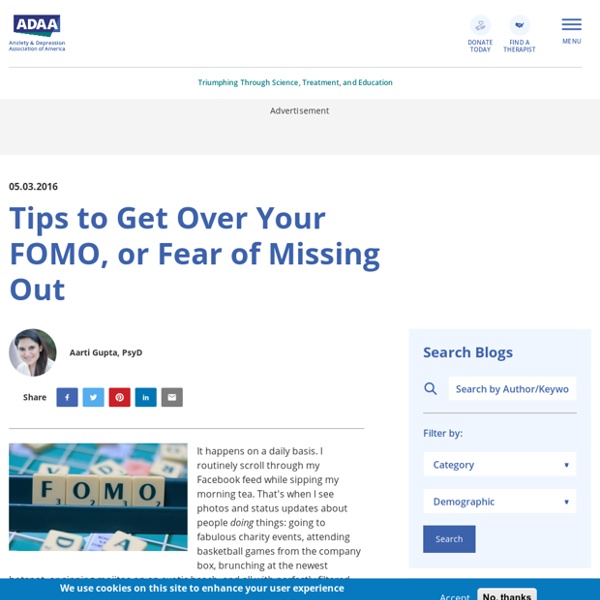Your brain and Bitcoin: The fear of missing out is real
Whether you're talking Bitcoin, Ethereum, Litecoin or Ripple, it seems everyone has someone in their circle who will seize any opportunity to announce a record-breaking run on their cryptocurrency investment (or, as has been the case for parts of January, an inevitable slide). It's impossible to scroll your social media feeds or be in any social setting without cryptocurrency coming up during the conversation. Those of us not investing in bitcoin usually come to the inevitable conclusion that we are somehow missing out and should be capitalizing on these seemingly impossible returns. Even the biggest skeptics feel a sting of regret when they hear about others who made upwards of 1,000 per cent or more on their cryptocurrency investment.
Smartphone addiction could be changing your brain
"Nomophobia?" you mutter as you read this on your ever-present smartphone. "Of course not."
And So Are Its Mental Health Risks
A lot of us must be wondering if we're hooked on our tech: Searches for “phone addiction” have risen steadily in the past five years, according to Google Trends, and “social media addiction” trails it closely. Interestingly, phone addiction and social media addiction are closely intertwined, especially for younger people, who probably aren’t playing chess on their phones or even talking on them—they’re on social media. And according to a growing number of studies, it’s looking more and more like this pastime is addictive. Even more concerning is the fact that this addiction is linked to some serious mental health risks.
Cell Phone Addiction Signs and Symptoms
Table of Contents Signs and Symptoms of Cell Phone AddictionPhysical Effects of AddictionPsychological Effects of Cell Phone AddictionSelf-Assessment: Am I Addicted to my Smartphone? The recent explosion of iPhones, Androids, and other smartphones has provided people with the ability to access the entirety of the Internet on-the-go and at any given moment. 90% of adults in America own a cell phone,1 and while this may not be a problem for many people, some individuals develop an addiction to their mobile devices. 90% of American adults own a cell phone.1 Cell phones are constantly being improved by expanding upon their functionalities, which in turn increases the likelihood of overuse and addiction. According to the PEW Research Center, 67% of smartphone owners have admitted to checking their phone for calls or messages when their phone didn’t vibrate or ring.1 This is one major sign of cell phone dependence and should serve as a warning to cell phone owners.
Study links mobile device addiction to depression and anxiety
CHAMPAIGN, Ill. — Is cellphone use detrimental to mental health? A new study from the University of Illinois finds that high engagement with mobile technology is linked to anxiety and depression in college-age students. The study was published in the journal Computers in Human Behavior. “There’s a long history of the public fearing new technologies as they are deployed in society,” said U. of I. psychology professor Alejandro Lleras, who conducted this study with undergraduate honors student Tayana Panova.
The Fear of Missing Out: Or How I Learned to Stop Worrying and Love Instagram
I used to have this problem. It was almost like an addiction. Except I wasn’t actually consuming something — rather, it was like an addiction of wanting to consume things that I couldn’t. I’m not proud of this problem. In fact, I used to hide it from family and friends.
Adolescents with ADHD and the Risk of Internet Addiction
It is already established that there is a very high likelihood that those with ADHD will abuse drugs such as alcohol and marijuana. Also, they are more likely to have problems at school because of difficulties with focusing and experience social difficulties except with other youngsters who feel like outsiders. Now, it appears they have another problem confronting them and it's Internet Addiction. A new study seems to suggest that adolescents with disorders such as ADHD, Depression and Social Phobia, are more likely to become addicted to the Internet as compared to other teenagers. The study appears in the October 2009 issue of Archives of Pediatrics and Adolescent Medicine.
Cell-Phone Addiction: A Review
Internet Addiction
What is Internet addiction? Internet addiction is described as an impulse control disorder, which does not involve use of an intoxicating drug and is very similar to pathological gambling. Some Internet users may develop an emotional attachment to on-line friends and activities they create on their computer screens. Internet users may enjoy aspects of the Internet that allow them to meet, socialize, and exchange ideas through the use of chat rooms, social networking websites, or "virtual communities." Other Internet users spend endless hours researching topics of interest Online or "blogging".
Online Disinhibition Effect (Suler)
Summary: The online disinhibition effect describes the loosening of social restrictions and inhibitions that are normally present in face-to-face interactions that takes place in interactions on the Internet. Originators and Key Contributors: In 2004, John Suler, professor of psychology at Rider University, published an article titled “The Online Disinhibition Effect,” which analyzed characteristics of internet interactions that contributed to this effect[1]. The term “online disinhibition effect” was already in use at the time. Keywords: online, internet, anonymity, invisibility, imagination, disinhibition Online Disinhibition Effect (Suler) John Suler describes two main categories of behavior that fall under the online disinhibition effect.



